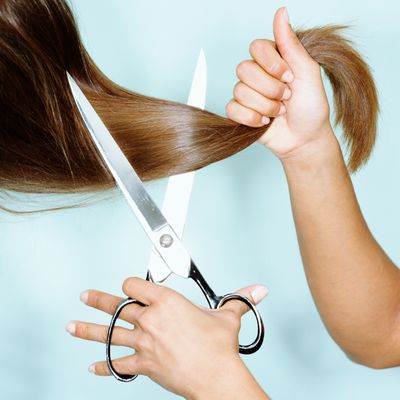
For the past 20 years, Julianna Evans, the director of marketing for the Lumberyard, a contemporary performing-arts company based in New York City, has had the same flowing brown locks. Her stylist in her hometown of Washington, D.C., has been trimming her hair every 12 months for as long as she can remember, and always colors it the same medium-brown shade. Then came the November 8 election upset, and Evans fell into a downward spiral. “I cried for three days,” the Atlanta native, 45, recalls. “I felt like it was the worst thing, politically, that ever happened in my lifetime. It was catastrophic.” By Friday she noticed grays growing in, so she put on her big-girl panties and dragged herself to the drugstore. “Literally without thinking, I grabbed the Natural Black box by Garnier,” she says. “I was like, f** it! The election deadened my soul. I think I wanted to do something defiant to feel stronger.”
That sense of malaise is spreading across D.C. As women stare up at that glass ceiling still hanging over them and contend with a pussy-grabbing kleptocrat moving into the nearby White House, they are collectively — however subconsciously — making their own statements of rebellion by challenging traditional notions of beauty. Just ask any hairstylist in the Beltway.
“When you see that much blonde hair on the floor, you know something is going on,” says Nicole Butler, creative director and master colorist at Daniel’s Salon in Dupont Circle. During the notoriously slow month of November, her salon received a startling number of bookings, with at least three women a day sitting in her chair and asking for a drastic change, like cutting off six inches, going black, or going platinum. “Usually stuff like this is planned for weeks and put on the books after several consultations, but this was very spontaneous,” Butler says. “It was like a mass declaration of independence.” Clients, especially those over 40, expressed a feeling of loss and uncertainty, says Butler. “Maybe this is some kind of compensation for not getting what we wanted in the election. By changing our hair, we can control the outcome.”
Marion Jacobs, a former professor of psychology at UCLA and the author of Take-Charge Living: How to Recast Your Role in Life … One Scene at a Time, believes the phenomenon is a way for women in D.C. to feel powerful in a moment where a stranger has seized the steering wheel. “When people experience a change that is so opposite from their value system, that’s very unnerving,” says Dr. Jacobs, who has a private practice in Laguna Beach, California. “People will use all kinds of coping mechanisms, and cutting their hair and changing their look is one way to show or feel that they are doing something over which they have control.”
Over at Georgetown Salon & Spa, one of the most exclusive salons in D.C., much-sought-after colorist and stylist Mariangela Moore has witnessed this “take control” movement daily for the past month. “One of my clients said, ‘Think of Melania Trump and go in the opposite direction,’” she says. “She said, ‘I don’t want to be that person people see as sexual, I want to be seen as strong.’” Another professional woman cut her hair into a flattop. One client got rid of the blonde highlights she maintained forever, “because she said she never wants to be seen as cheap. I don’t know where that idea came from, but maybe that’s what she’s hearing.” A move away from the look of political parrot Kellyanne Conway, perhaps. In the comfort of Moore’s salon chair, D.C. women are expressing their anger and frustration, and taking a stand with their hair: Many have gone dark and lopped off length. “I don’t know if it’s that their right to choose could be in jeopardy, or that the glass ceiling is still there, but [since the election], I’m seeing more professional women, from all walks of life, changing the way they look.”
George Washington University teaching instructor Dr. Kristian Henderson had been battling with her hair for years, but after the election, she finally took off her weave and cut it all off. “The election results felt like an attack on minorities, women, and marginalized people in general. Having long hair was my attempt to fit into society, so after the election, I felt a need to exert my ‘uniqueness’ and not tie my femininity to the length of my hair,” she says. Vegan chef Mya Zeronis — who says she’s “a minority in almost every way possible: immigrant woman of color and LGBQT person” — clipper-cut her brown hair on November 18 “to send a message to the Trump presidency.” But it’s not just liberals making female-empowerment smoke signals at the hair salon. “I have clients who were so heavily criticized for not voting for the ‘right’ candidate, so they came in for a big change,” remarks Georgetown Salon & Spa’s Moore. “The way they style their hair is a message they can control.”
Julianna Evans likes the narrative she’s commanding, and says she’s keeping her goth look, though her stylist has added some more natural lowlights. “You have to live here to understand that we are immersed in politics every day,” the mother of two explains. “For many of us, with this election, it’s like your boyfriend dumped you in a really shocking way with no explanation and then moved in next door.” She is resigned to fighting against what she sees as a mandate for sexism through her own style choices. “Now, I feel like my hair says you can’t bring me down. This misogyny will not persevere. The bumper sticker for me is, ‘I am woman, hear me roar.’”




